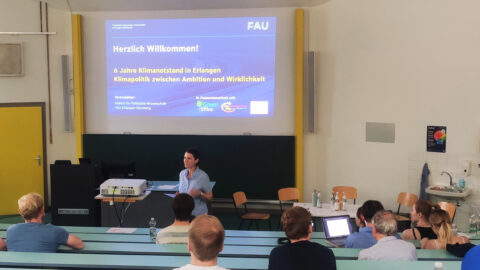Erlangen’s Climate Policy under Scrutiny – Discussing the Movie “Zusammen”
What is the state of Erlangen’s climate policy six years after the city council declared climate emergency? On July 1, this question was the focus of a discussion on the film “Zusammen”, which portrays Erlangen’s participation process. The event was organized by the Chair of Comparative Politics at the Institute of Political Science in cooperation with the Green Office of FAU Erlangen-Nuremberg and the associations Forum1.5 Mittelfranken and Energiewende ER(H)langen.
First, the documentary film Zusammen – Ist DAS der Weg aus der Klimakrise? by Ronja and Niklas von Wurmb-Seibel was screened. The film sheds light on the comprehensive participation process that followed the Erlangen climate emergency resolution in March 2019. In November 2020, the so-called “Climate Awakening” was launched in Erlangen, in which a citizens’ council and a stakeholder group developed a total of 41 measures to achieve climate neutrality in Erlangen. The foundation for this work was a resolution by the city council to become climate-neutral by 2030 and to adhere to a residual CO2 budget to achieve the 1.5-degree target at local level. The film “ Zusammen” gives the participants in the Citizens’ Council and the stakeholder group a chance to speak and thus conveys an impression of the diversity of personal experiences that were brought into the participation process.
In the subsequent discussion, which was moderated by Prof. Sandra Eckert (Chair of Comparative Politics), initiators (Sabine Bock, Erlangen City Administration), participants (Christian Lange, formerly Fridays for Future) and academic observers (PD Dr. Klaus Geiselhart, Selim Küçükkaya, both FAU) reflected on the process and its results. Klaus Geiselhart had scientifically evaluated the participation process in Erlangen and gave a positive assessment of the degree of politicization achieved through its deliberative character. Sabine Bock argued that the citizens’ council and stakeholder group not only increased acceptance of the climate targets, but also had a positive influence on their ambition. Bock gave an up-to-date overview of the implementation of the action plan and explained why the 1.5 degree target agreed in 2020 has already been exceeded. Against this backdrop, the city’s target was recently adjusted to 1.75 degrees.
Selim Küçükkaya considers Erlangen to be a pioneering municipality in comparison to the 2,300 resolutions worldwide, despite exceeding the target. Erlangen has not only set itself a comparatively ambitious target, but has also created important implementation capacities with the participation process and the creation of new positions. Christian Lange also looks back on the past few years with cautious optimism. After his movement had criticized the prioritization of only 14 measures at the time, the current status shows that the achievement of the target is on the right track with 28 measures now being planned or implemented. According to Lange, however, he is concerned about the current geopolitical situation and the low prioritization of climate policy goals – in this respect, social pressure must be maintained.
